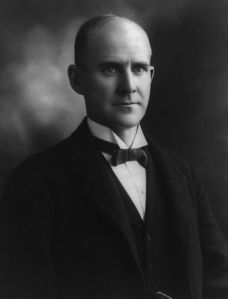Eugene Victor “Gene” Debs, born on this day in history in Terre Haute, Indiana, was an American socialist who ran five times for President of the United States, the last time from a prison cell.
Debs started working on railroads at age 14, and eventually founded the American Railway Union (ARU), leading it in the Pullman Strike of 1894. President Grover Cleveland used the United States Army to break the strike. As a leader of the ARU, Debs was convicted of federal charges for defying a court injunction against the strike and served six months in prison.
Historian Lawrence Wittner reports:
As Debs brooded on these events, he concluded that, although industry-wide unions were vital, they could not win their battles for economic and social justice while giant corporations dominated the government. In Europe, workers were forming labor and socialist parties. Why not in America? At the beginning of 1897, in an open letter to the remnants of the American Railway Union, he wrote: ‘I am for Socialism because I am for humanity. We have been cursed with the reign of gold long enough.’”
Debs emerged from jail committed to socialism, and was a founding member of the Social Democracy of America (1897), the Social Democratic Party of America (1898), and the Socialist Party of America (1901).

Eugene V. Debs in 1897
Debs ran as a Socialist candidate for President of the United States in 1900 (earning 0.63% of the popular vote), 1904 (2.98%), 1908 (2.83%), 1912 (5.99%), and 1920 (3.41%). A charismatic speaker, Debs drew many to the Socialist Party. At its peak in 1912, Socialists held 1,200 public offices in 340 American cities, including 79 mayors in 24 states.

Campaign poster from his 1912 Presidential campaign, featuring Debs and Vice Presidential candidate Emil Seidel
But with the declaration of war in April 1917, the fortunes of the party changed. The Socialists had declared their “unalterable opposition to the war” and Congress responded by passing the Espionage Act of 1917 to prosecute Socialist Party leaders. The Act was intended to prohibit interference with military operations or recruitment, to prevent insubordination in the military, and to prevent the support of U.S. enemies during wartime.
As Wittner recounts, the federal government began prosecuting Socialist Party leaders, and the postmaster general banned virtually every Socialist newspaper, magazine, or other publication from the mails. Socialist Party headquarters around the nation were raided, their records seized, and their officers tried and imprisoned.

1918 Canton, Ohio Rally
Debs was outraged, and on June 16, 1918 in Canton, Ohio, he delivered a famous speech in which he pointed out that “[w]ars throughout history have been waged for conquest and plunder.” Even worse, as he charged:
The master class has always declared the wars; the subject class has always fought the battles. The master class has had all to gain and nothing to lose, while the subject class has had nothing to gain and all to lose—especially their lives.”
Less than two weeks later, Debs was indicted by a federal grand jury for violating the Espionage Act, and sentenced to ten years in prison.
On December 23, 1921, President Warren G. Harding commuted Debs’ sentence to time served, effective Christmas Day. He did not issue a pardon.

Debs leaving the federal penitentiary in Atlanta on Christmas Day 1921, following commutation of his sentence
When Debs was released from the Atlanta Penitentiary, the other prisoners sent him off with “a roar of cheers” and a crowd of 50,000 greeted his return to Terre Haute to the accompaniment of band music.
Debs spent his remaining years trying to recover his health which was severely undermined by prison confinement. In late 1926, he died of heart failure at the age of 70.
You can watch a video of Mark Ruffalo delivering an excerpt of Debs’ speech of June 16, 1918 here:




Leave a comment